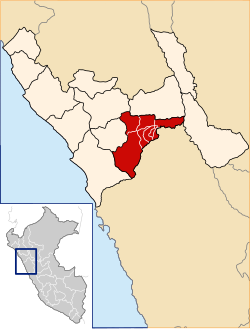History
On July 23, 1610, a group of immigrants were allowed to found a village, which would serve as capital city and as headquarters for both mining and related wheat sowing activities. Among Santiago de Chuco's "Founding Fathers", who arrived first in Andaymarca, we find Captain Don Diego de la Serna, immigrants Domingo Pérez de Vásquéz, José de Pelaez, Lino Benítes de los Niños, Miguel de Estremadura, Rodrigo de los Bejarano, Fernando de Alva, García de Paredes, Lorenzo de Alcántara, Juan Bautista de Ruiz and the priest Francisco de Asís Centurión, who was born in Santiago de Compostela. Father de Asís Centurión was he who got "Santiago, El Mayor" to become the main saint of the town.
On July 25, 1610, in front of an altar which was set in a place named "Picchi-Paccha", a mass of thanksgiving was celebrated;the "Foundation First Stone" was then placed. The distribution of lands for house building took place and the architectural design of the city and church were outlined. The City Church would later be inaugurated on July 25, 1616. In this same year, the town was given its current and definitive name, Santiago de Chuco, by the Peruvian government.
In 1863, the congressman for Huamachuco, Don Manuel Natividad Porras, filed a bill for Provincial Status for Santiago de Chuco District. The Bill failed to be enacted at that time due to the sudden death of Don Manuel Natividad Porras. On November 3, 1900, through support of congressman Tomás Ganoza Cavero (who carried on with Manuel Porras's work), President Eduardo López de Romaña passed the bill which granted Provincial Status to the Santiago de Chuco District.
This page is based on this
Wikipedia article Text is available under the
CC BY-SA 4.0 license; additional terms may apply.
Images, videos and audio are available under their respective licenses.



